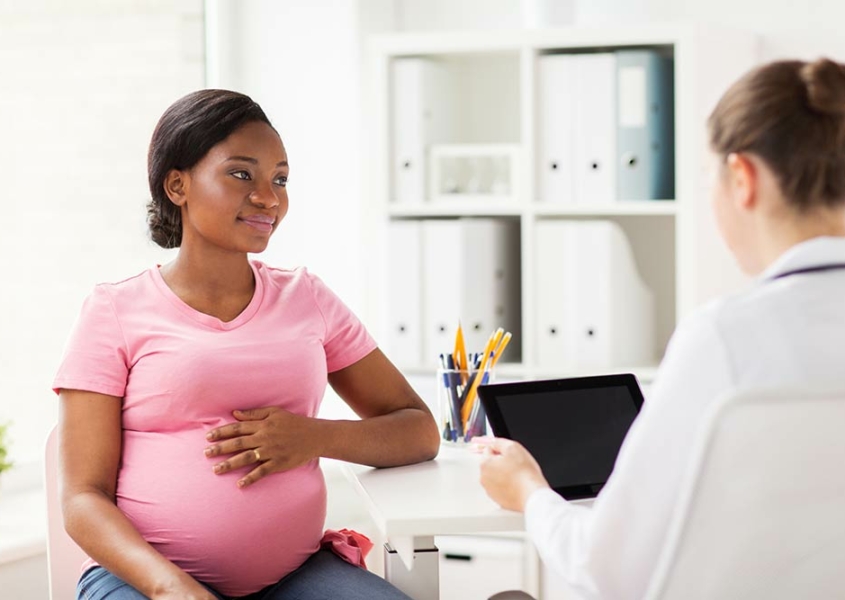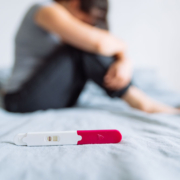Getting Pregnant: Fertility Tips for Problems Conceiving
Thinking about getting pregnant and starting a family can be an exciting time. But when it takes longer than you expect to get that positive pregnancy test, you may start to wonder “Why am I not getting pregnant?”
As a Madison OBGYN, I meet with many women who are wondering what they can do to get pregnant faster. I enjoy supporting women in their “trying to conceive” journeys and want to answer the most common questions I’m asked as well as address misinformation that can be confusing and even hurtful.
Chances of Getting Pregnant by Age
Your age plays a role in your fertility. Women are born with a fixed number of eggs and your total number of eggs declines with age. The term “ovarian reserve” refers to your egg supply.
Women in their 20s have peak fertility. Their fertility starts a slow decline around age 32, with a more rapid decline around age 37.
- A healthy woman in her 20s has a 25% chance of conceiving naturally each month.
- A healthy woman in her 30s has a 20% chance of conceiving naturally each month.
- A healthy woman in her 40s has a 5% chance of conceiving naturally each month.
When You Should See a Doctor About Getting Pregnant
About 80% of couples conceive in the first 6 months of trying. That number increases to 85% after 12 months. If you have regular menstrual cycles and have been trying to conceive for a year, then it’s a good idea to talk to your OBGYN about it. We will evaluate to see if there are other issues that make it harder for you and your partner to conceive.
If you’re over 35 years old, have this conversation with your doctor sooner—after you’ve been trying to conceive for 6 months. If you are in your 40s and want to have a baby, it’s better to speak with your OBGYN right away because often fertility treatments can be started right away.
No matter your age, if you know you have irregular periods (consistent cycles less than 25 days or greater than 35 days apart), get evaluated sooner. If you have other health problems, make a preconception visit to make sure these conditions are optimized prior to conceiving.
Before you are referred to a fertility clinic, your OBGYN can rule out and/or treat common issues. Sometimes we can recommend small changes that can help you get pregnant.
Madison Women’s Health OBGYN clinic refers patients to fertility clinics when:
- you are 40+;
- there is concern about early menopause;
- after 3-6 months of using Clomid or Letrozole to induce ovulation (or a little longer if we can prove you are ovulating on these medications);
- there are abnormal semen parameters that require intervention;
- or there is any other reason to expedite your chances of conception.
Problems Conceiving? How to Prepare for Your First OBGYN Visit
- Track your menstrual cycle. Cycle length and regularity are important for fertility. Tracking your menstrual cycle will help your doctor know if you are ovulating each month. Use a calendar or a tracking app to mark the first day your period begins (first day of red bleeding). Most apps have other parameters you can input, but your period is most important. Bring your calendar or app!
- Know your medical history and family history of genetic conditions. If you are visiting Madison Women’s Health for the first time, be sure to bring your health records and any testing or blood work you might have done previously.
Best Apps for Tracking Your Fertile Window
When it comes to tracking your menstrual cycle and your “fertile window” (the days when you are most likely to get pregnant) you can go as high-tech or low-tech as you want. Whether you want a basic calendar or an app that syncs with all your devices, choose something you know you can use consistently.
There are hundreds of apps to help identify your fertile window, but only about 20 that research has considered to be reliable and easy to use. It’s important to choose an app that is based on accurate scientific data. The app that I recommend to my patients is the Glow App. It’s available on the iTunes App Store and on the Google Play Store. There are both free and paid versions. You can even join online communities with people who are trying to conceive (just be careful about following advice from people who aren’t medical professionals).
Getting Pregnant with Irregular Periods
If you have irregular periods, it’s important to discover what is causing them. Too-short or too-long of cycles can be caused by anovulation (not ovulating), thyroid conditions (hyperthyroidism, hypothyroidism), being underweight or overweight, extreme stress, and being near puberty or menopause. We have blood tests to help us find the cause.
Common Tests for Fertility
In addition to checking blood work, your OBGYN will also evaluate your uterus to make sure there isn’t anything about your uterine anatomy that makes it difficult to get pregnant.
At Madison Women’s Health, we can do a Saline Infusion Sonohysterogram, often called an SIS. After injecting saline fluid in the uterus, we use ultrasound equipment to evaluate the uterine cavity.
It’s also important to know if your fallopian tubes are open so a sperm and egg can meet. The hysterosalpingogram, or HSP, is like an SIS but uses an x-ray machine to view your uterus and test if your fallopian tubes are patent (open).
Testing Male Factor
Because male factor infertility is very prevalent (in approximately 10% of infertility cases, a male factor is the only identifiable cause), a semen analysis is an important step in the process. His tests are less costly and much less invasive. While we don’t evaluate male factor infertility at Madison Women’s Health, we can place the order for your partner to have a semen analysis done in Madison. Abnormal semen parameters warrant referral to a specialist for infertility.
Prescriptions to Induce Ovulation
If your test results show that you aren’t ovulating, your doctor may prescribe a medication to give your ovaries a boost. Clomid and Letrozole work by making the body think your estrogen is low. This makes the ovaries ramp up production of follicles that lead to ovulation.
Clomid has been used for many years without known adverse long-term effects. Common short-term side effects are hot flashes, nausea, bloating, mood swings, and headaches.
Letrozole is a newer medication used to induce ovulation. It is not FDA approved for this, but has been documented as safe and effective. We often recommend this instead of Clomid. Your OBGYN will work with you to prescribe the best medication for your situation.
Read more about getting pregnant with Clomid or Letrozole.
Natural Ways to Increase Your Fertility
Not everyone needs or wants medical intervention to get pregnant. There are natural things you can do to increase your chances of getting pregnant each month.
- Timed intercourse during your fertile window. If you’re tracking your cycle each month, you’ll know approximately when you’re ovulating. Have sex every 1-2 days during your fertile window, which is about 5-6 days before you ovulate. (For example, if you have a 28 day cycle, with day 1 being the first day of your period, you can estimate your fertile window to be days 9-14 of your cycle.)
- Avoid using lubrication. Most over-the-counter lubricants inhibit sperm. If you need lubrication during intercourse, use a lubricant specifically made for couples who are trying to conceive, like Pre-Seed. You can also use canola oil or mineral oil.
- Healthy weight. If you are underweight or overweight, you may not ovulate or have a regular menstrual cycle. If you are overweight with frequently missed periods, decreasing your weight by as little as 5% can increase your chances of having regular periods and conceiving.
- Limit alcohol to 2 drinks per day. Cut alcohol completely out when you are actively trying to get pregnant.
- Reduce caffeine. At typical levels of caffeine intake, there does not appear to be an association between caffeine consumption and inability to conceive. Some studies suggest that going overboard may not be helpful, however, so try to limit to no more than two 8oz cups of coffee per day.
Common Misconceptions About Increasing Your Fertility
When people find out you are trying to conceive or are having problems getting pregnant, you may get a lot of advice. People have good intentions but may have limited medical knowledge. It can get confusing sorting through all the health blogs, fertility forums, and more. It can also be painful when people think they have an easy solution to something that is so private and personal. Here are some common myths about getting pregnant and increasing fertility:
- “Herbs, vitamins, teas and supplements will increase your fertility.” This is not necessarily true. Eat a healthy diet, take a prenatal vitamin, and exercise. Healthy women are more likely to have healthy pregnancies.
- “This super food will increase your fertility.” There are many so-called fertility diets. If there was a super food that increased a woman’s chance of getting pregnant, everyone would use it! If a website endorses a specific food for fertility (like yams and pineapples), they are based on small, poorly done studies. They are full of antioxidants, however, which are great for overall health!
- “Don’t worry, it’ll happen when you quit trying so hard.” First of all, I am sorry if anyone has said this to you. This statement simply adds guilt to the stress that infertility is already creating. At the most, the stress related to fertility troubles may slightly lengthen the amount of time it takes to get pregnant. Stress only affects your fertility if it prevents you from having intercourse or is affecting your menstrual cycle.
- “Get in the right position.” Certain positions during sex, elevating your hips, lying flat for twenty minutes afterward do not increase the likelihood of conceiving.
If you come across any other advice that promises to be “the answer to all your fertility troubles,” be wary. Will it help you eat healthier? Does it encourage you to be active? Fertility is complex and there isn’t a right answer for everyone. Be sure the advice encourages healthy habits and listen to your doctor’s recommendations.
Focus on Your Health
One of the best things you can do to improve your chance of getting pregnant and have a healthy pregnancy is to optimize your own health. No matter what age you are, it is important to be cognizant of your weight. Eat a diet rich in vegetables, lean protein, whole grains, and healthy fats. Reduce your alcohol and caffeine consumption. Get regular exercise. Begin taking a prenatal vitamin right away. The healthier your body is when you are trying to conceive, the better your chances of having a healthy pregnancy.
The key point in all the fertility advice you may receive is this: be healthy, let us know if your menstrual cycle is abnormal, have timed intercourse, and see a doctor for a preconception visit if you have questions about your health before trying to conceive.
At Madison Women’s Health, we are here for you in your journey to pregnancy. We’re excited to be your partners as you grow your family! To make an appointment with one of our providers, call (608) 729-6300.
 Dr. Ashley Durward has been providing healthcare to women in Madison since 2015 and joined Madison Women’s Health in 2019, specializing in high and low risk obstetrics, contraception and preconception counseling, management of abnormal uterine bleeding, pelvic floor disorders, and minimally invasive gynecologic surgery.
Dr. Ashley Durward has been providing healthcare to women in Madison since 2015 and joined Madison Women’s Health in 2019, specializing in high and low risk obstetrics, contraception and preconception counseling, management of abnormal uterine bleeding, pelvic floor disorders, and minimally invasive gynecologic surgery.










